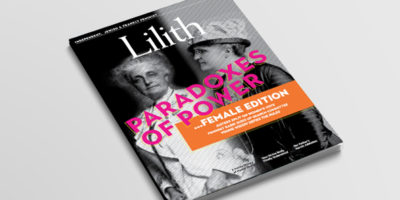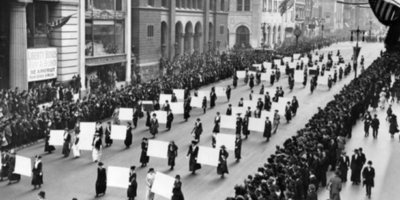
My Body, Divinely

Illustration by Shifra Whiteman
When I was growing up, I hated my body.
I lived in a world where it was the ultimate currency, your identity card for life, if it fit into the norms outlined by the parallel universe I lived in. Everything I was expected to achieve hinged on my body, but I couldn’t do it with the body I had.
In the Orthodox Jewish world in which I was raised, marriage was the be-all and end-all, the sign of significance for any woman. And in a world where matchmaking is standard and every detail is nitpicked by a prospective mother-in-law, body weight matters. So much so that the majority of conversations I heard about the sadness, the nebach of single people, revolved around their body shape. Anything wrong in anyone’s life was attributable to her weight.
My body would prevent me from marriage; I knew that at a young age. And because I was a girl, soon to be a woman, marriage was all I had. So my family members moaned and groaned about my body, and my teachers looked at me worriedly, and I was once again told not to go for that piece of chocolate cake, because my body was fat and needed to be changed.
I knew I had a brain, knew it was a good one. But I also had a woman’s body, which meant my aptitude for learning, my ability to understand, wasn’t going to be half as valued in the long run. Not in this community where women’s voices were heard only in certain spaces and places and were secondary to their abilities as mothers. Not in this place where single girls were maligned, where being an unmarried woman meant sitting at the kids table well into your twenties.
When I was in middle school, my school psychologist loaned me a bright pink volume filled with witty cartoons that illustrated the myth of the beauty industry, how women didn’t need to diet themselves thin and smother themselves gorgeous, because it was all just a way for the industry to make money, and men didn’t care anyway. It became my bible. I loved it and I believed it, fiercely—or at least I wanted to. I tried to follow the book’s encouragement to use cheap sorbolene cream instead of expensive department-store products, but I still felt prettier when I knew I used the same brands the girls in the magazines did. I continued my journey into the library, to the feminist section. I tried to believe that my thighs weren’t the reasons I had no friends in seventh grade and that one day a man would marry me just like all the other large-thighed women of my community who were married with children. But I never really could.
Because—even if diets were just an industry—I still needed to find a way to lose weight to be thin and pretty, didn’t I? I still couldn’t eat whatever I wanted and be happy, could I? Even if makeup was just a ploy to get women to spend money, I still looked better wearing it, didn’t I?
I thought these books about feminists saying it’s alright to be fat or hairy were by women who lived in a world where that was okay. They weren’t seventh-grade Jewish girls. They weren’t fat. They didn’t have thighs that didn’t get them invited to the mall on Sunday afternoons. They didn’t live in a world where it wouldn’t matter how great your marks were in school, or how much you excelled academically. It only mattered if you could catch a husband. They didn’t live surrounded by an organized set of laws and rituals that dictated how you looked, what you wore, and how your body was presented.
Women were on the other side of the curtain in prayer. Women weren’t included in formal rituals. We weren’t allowed to be part of the conversations that I so craved to join, and there was no reason for this other than the fact of my body. The fact that it existed in feminine form. Being a girl was the worst, being a woman was tough, and being a fat girl just about the hardest thing I had to endure, I thought. I hated my body, and with it I hated the femininity that was so abhorrent, so apparent.
After years of dieting and a painful journey through eating disorders, I found myself at the age of 30, staring at the lowest number I’d ever seen on the scale. I was astounded. Not because of the number on the scale—I’d known those last few months that my weight was dropping, the size of my pants told me that—but because I felt no different than by rishe groner before. If anything, I felt more miserable. I was going through a trying time, a time of loneliness, hurt, pain and rejection, and no matter the number on the scale, nothing was going to fix that.
There were years when I dedicated my entire life to my weight loss journey. I called it that, capitalized. My Weight Loss Journey. I had blogs and Weight Watchers journals and apps and notebooks where I documented every calorie, and never strayed too far from a bathroom. Once, I lay on the floor in the gym where I spent two hours a day and cried. I couldn’t find the words to express what I was feeling. “It’s… never… going… to end…” I exhaled, the monumental weight of a life of body hatred crashing down on me as I realized that my battle with my body truly would never end, not unless I stopped it myself. That even if I went to gym daily and documented every calorie, even if I had the figure of a supermodel, the struggle remained. In a world where my body had failed me so many times—being overweight so I never got the long pursued man prize, and being a woman so I couldn’t get as far as I needed to at work—I just couldn’t learn to love and accept something that had so utterly failed me.
But I had to. I needed to love myself. I could receive all the compliments in the world, but at that time, it meant nothing if it wasn’t truly believed by me.
So I began a new journey—into embodiment. I found myself drawn to practices far from my former religion of the “Summit” trainer at the gym, or the calorie-counting apps of Weight Watchers. I didn’t want to master my body—I wanted to live in it. I wanted to be with it.
So I danced. I ate. I sang. I used my body as a tool of the Divine, and learned this wasn’t so new to the Jewish traditions I thought I understood inside out. I grew to embrace the Shechina as the embodied, feminine aspect of God. I understood that this meant that our bodies themselves are sacred, and began to wonder if that is perhaps why they have been so maligned. In Kabbalah, the energy that represents the feminine physicality is “Malchut,” translated as “kingship,” signifying creative expression, manifestation, and embodiment. Dancing has been a part of celebratory rituals since that first Jewish celebration at the foot of the Red Sea. Eating has been subject of countless reams of Talmudic and Rabbinic literature as its inherent sacredness is debated in the forms of endless ritual and minute dietary laws. And singing has been the linchpin of traditions since the Levites sang in the Temple. All body-centric, all sacred. All real. Not the holiness of expanded spirit, but the reality of embodied Divinity.
And in this way I began to heal. Recently, I spent a few weeks filling in for a biology teacher at a local Orthodox girls high school in Brooklyn. I was teaching the girls about the reproductive system, but I didn’t want to see anyone tittering about sex. Instead, I reminded them. “Your body is a magical machine,” I said, as I explained the process of meiosis, mitosis and the natural phenomena that occur every day deep under layers of skin and tissue. “Take care of it. Love it. If people laugh about it, remember that’s only because it’s the holiest, and we’re not always comfortable with that.”
I wanted to tell them more. I wanted to tell them of my own journey, healing the body through water, good food, sleep, meditation, song, dance and a lot of love. I think of the way these girls still carry body talk as currency wherever they go, hearing the compliments of friends and moms and aunts and grandparents who are sooner likely to comment on five pounds dropped than achievement on a test. I know how hard it is to shift that thinking when you’re 16, and your prospective match—and his mother’s view of your waist size—is everything.
And I wonder what the future looks like.
Will parents be able to talk about how good their kids are without focusing on how they look? Can a grandmother squeeze her granddaughter’s hand and show her off at a family bar mitzvah without the conversation turning to her marriage prospects? Can a girl find ways to compliment and bond with her friends without it’s being about her belly, her butt, or the fat-free frozen yogurt she absolutely had to have yesterday? Can women feel successful in other ways, even if it’s not about losing five pounds or doing #yogaeverydamnday? How much time do we spend torturing ourselves about food, or exercise, or the size of our bodies? How could that time be used? What if all that energy were channeled into true transformation of the inside, not the outside?
When I was growing up, I loved Jewish ritual, but found it alienating in my female body. Today, I embrace it. I recognize the healing waters of the mikveh as they force me to be at one with my body in its divine physicality, I bless the wicks and the flames of the Shabbat candles as they convert the air of my home into something sacred, and I incorporate the rituals of blessing my food before and after eating to ensure that I treat every moment of nourishment as one of self-love and prayer. I think about how simple self-love and acceptance of the female body can transform not just our own lives, but the world around us. A mom who eats well instead of riding the diet rollercoaster is less likely to snap at her kids. A relationship based on self-love without the external validation of “Does my butt look big in this?” is ready to make creative impact on the world. A child who satisfies her hunger can concentrate in school, and a teen who feels empowered can change the world.
And a body, once maligned, viewed as an enemy to fulfillment and achievement, becomes the ultimate sacred tool.
Rishe Groner is the founder of The Gene-Sis, a movement towards embodied Jewish practice based on mysticism and feminine expression. She is a writer, strategist and storyteller, and lives in Brooklyn, NY.



